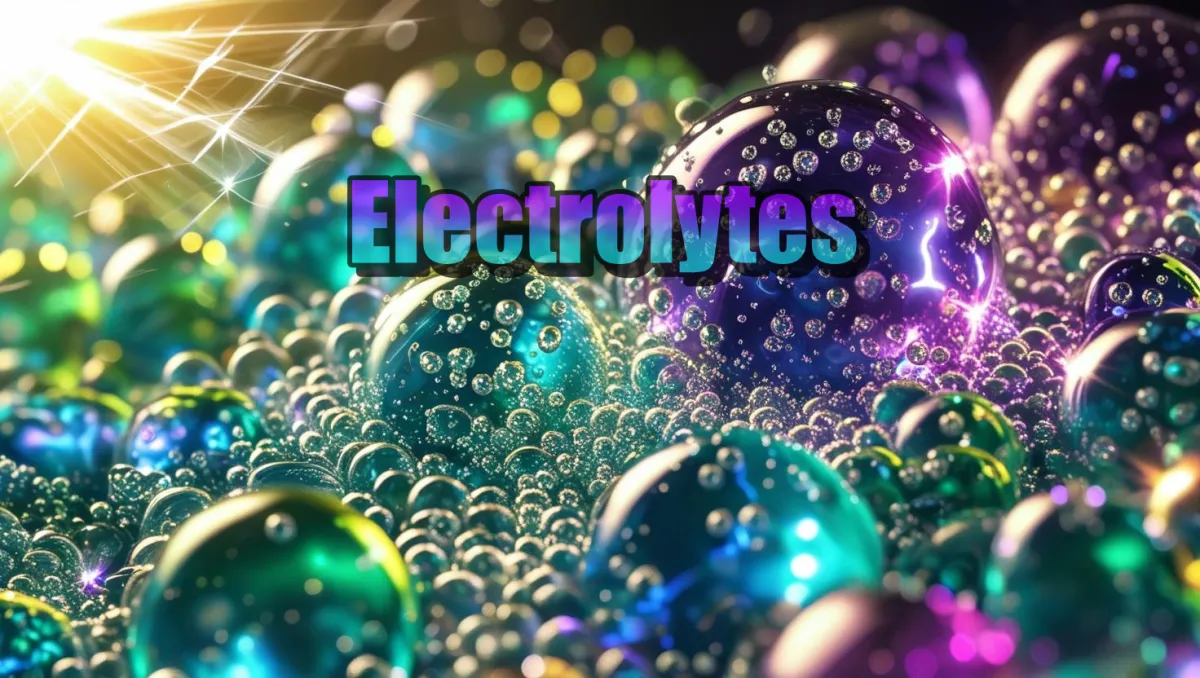
Electrolytes are Minerals
Electrolytes are minerals but not all minerals are electrolytes. Basically, electrolytes are mineral substances that produce an electrically conducting solution when dissolved in water or body fluids (including our blood, sweat, and urine) . Electrolytes are essential for a number of bodily functions. They help balance the amount of water in our bodies, balance our body's pH level, move nutrients into our cells, and remove waste from our cells. They're also important for nerve function, muscle function, and many other important bodily processes. In nutrition, the electrolyte term refers to essential minerals in your blood, sweat, and urine.
The main electrolytes in our body systems include sodium, potassium, chloride, bicarbonate, calcium, phosphate, magnesium, copper, zinc, iron, manganese, molybdenum, copper, and chromium. In terms of body functioning, the six electrolytes that get most people's attention seem to be sodium, potassium, chloride, bicarbonate, calcium, and phosphate.
Here's a breakdown of each:
· Sodium: Primarily found in extracellular fluid, sodium regulates fluid levels, nerve and muscle function, and helps maintain blood pressure.
· Potassium: As the major intracellular cation, potassium is essential for nerve and muscle function, including the heart, and helps transport nutrients into and waste products out of cells.
· Chloride: A major extracellular anion, chloride helps regulate fluid balance, blood volume, and blood pressure, and plays a role in maintaining the body's acid-base balance.
· Bicarbonate: An important component of the body's buffering system, bicarbonate helps regulate blood pH and also aids in the transport of carbon dioxide.
· Calcium: Crucial for bone health, calcium also plays a vital role in muscle contraction (including the heart), nerve function, and blood clotting.
· Phosphate: Important for bone and teeth health, phosphate also plays a role in muscle and nerve function, energy production, and DNA and RNA structure.
The lesser of the main electrolytes of magnesium, zinc, iron, manganese, copper, and chromium are all essential minerals for human health. They are needed in small amounts (trace elements) but also play vital roles in various bodily functions.
Here's a breakdown of their importance:
· Magnesium: Supports over 300 biochemical reactions, including muscle and nerve function, blood sugar regulation, and energy production.
· Zinc: Essential for immune function, cell growth, wound healing, and the senses of taste and smell.
· Iron: Key component of hemoglobin, which carries oxygen throughout the body, and myoglobin, which provides oxygen to muscles.
· Manganese: Contributes to metabolism, bone formation, blood clotting, and reducing inflammation.
· Chromium: Important for insulin and glucose metabolism, affecting blood sugar levels.
2 Quick questions:
· Which of the 11 electrolytes above should you do without?
· Of all of the popular sports drinks and other so-called electrolyte replenishment drinks that you consume, how many of the listed above electrolytes do you see on your label?
While this may only be a partial list of electrolytes flowing through our sweat, blood, urine, there are others along with other essential minerals as well. There are other minerals as well that work as cofactors to help assist the electrolytes in many ways. Quick example of what a cofactor mineral and electrolyte relationship could be is the essential mineral “Molybdenum”. Molybdenum is an essential trace mineral that functions as a cofactor for several enzymes, including those involved in iron metabolism. Let your iron levels get unbalanced and you could end up in a hospital.
I know many medical and many nutritionists may say to not worry about those extra minerals because you can get them from eating a well-balanced diet. Unfortunately, there are many agricultural resources that report that our farm lands' mineral levels have been severely depleted for decades now. So, if the minerals aren’t in the soil, then minerals aren’t in the foods … oh well so much for that healthy eating thought. When you have a bad bout with diarrhea, excessive peeing and or sweating (from whatever), eating your way back to normal electrolyte levels might not be a great choice. Then there’s one always overlooked way of losing your electrolytes and that’s certain medications. Always check with the pharmacist to see if the medicine has electrolyte depleting abilities and or side effects.
I will say it this way as a re-cap that electrolytes are essential for numerous bodily functions: They are vital for various processes, including but not limited to:
· Nerve and muscle function: Electrolytes help with nerve impulses and muscle contractions.
· Fluid balance: They help regulate how much water is in your body and where it's located.
· Blood acidity balance (pH): Electrolytes help maintain the proper pH level in the blood.
· Nutrient transport: They help move nutrients into cells and waste products out of cells.
· Heart rate and blood pressure: They play a role in regulating these vital signs.
Electrolytes are also important because they can help:
· Keep your heart rate and rhythm steady
· Keep your bones and teeth healthy
Don’t forget to check your favorite electrolyte drink label. If you’re missing a lot or a few electrolytes then checkout one of my favorite electrolyte replenishment drinks that has the minerals, vitamins, amino acids and more. If you're looking to rebound your electrolyte levels in a positive direction by replacing and replenishing many of your lost nutrients, you don't know what you're missing if you've never tried ReboundFX sports drink

No statements on this website have been evaluated by the FDA, and are therefore not intended to diagnose, treat, cure, or prevent any disease. This site has not been endorsed, authorized, supported, or approved by Youngevity.
Bruce Jacobs
Certified Wholistic Health Coach
